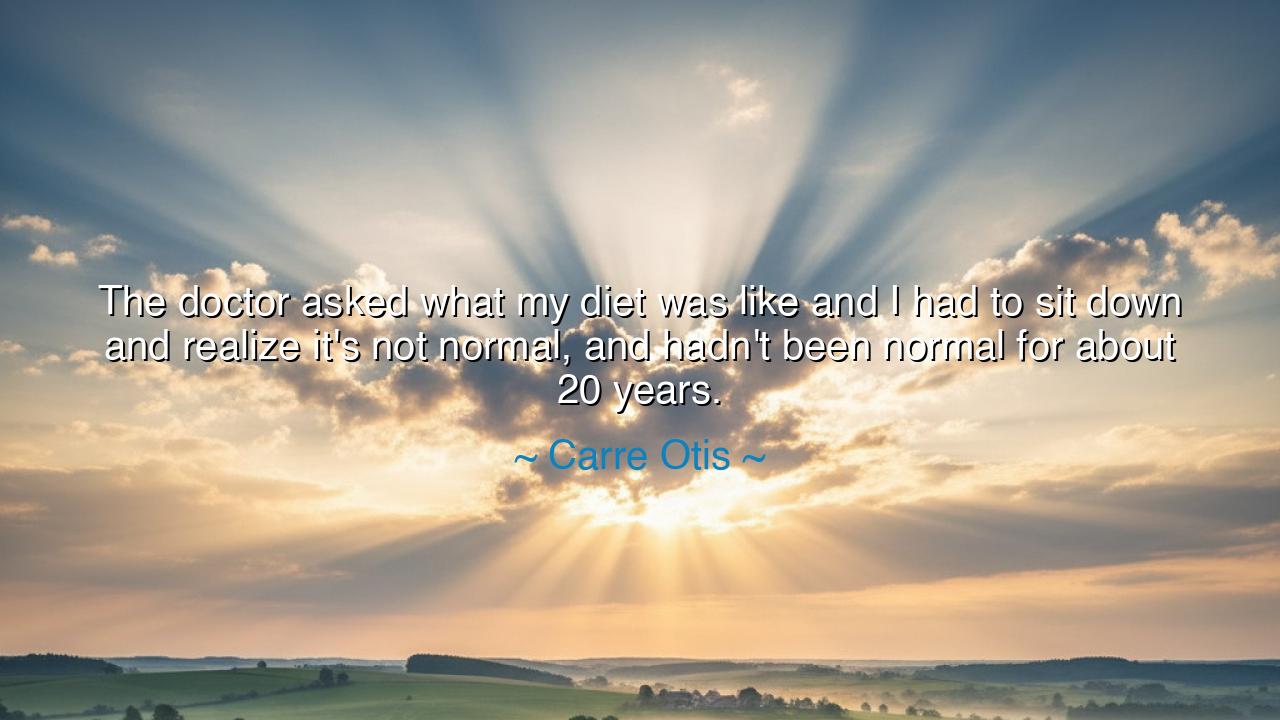
The doctor asked what my diet was like and I had to sit down and
The doctor asked what my diet was like and I had to sit down and realize it's not normal, and hadn't been normal for about 20 years.






"The doctor asked what my diet was like and I had to sit down and realize it's not normal, and hadn't been normal for about 20 years." These words, spoken by Carre Otis, are a profound reflection on the relationship between the body and the choices we make in life, particularly around nourishment. In her revelation, Otis uncovers a deep truth about the way we live—how we may become so accustomed to our routines, to the patterns of eating and living, that we no longer question whether they are healthy, or even normal. It takes a moment of clarity, like the one Otis describes, to realize that what we consume—in both food and spirit—has a significant and lasting impact on our lives.
In the ancient world, wisdom was often passed down through self-reflection. The great philosophers such as Socrates and Plato emphasized the need for self-examination as a way to understand one’s life and choices. Socrates famously stated, "An unexamined life is not worth living." To live without reflecting on our actions and choices, whether they relate to our health, virtue, or relationships, is to live in a state of ignorance and disconnection. Otis’s words echo this ancient teaching: by failing to examine her diet, she unknowingly allowed an unhealthy lifestyle to become normalized, a pattern that she had lived with for two decades. Only through the questioning of her choices did she come to realize the harm it had caused her body and spirit.
The Romans, too, understood the importance of balance and moderation in all things. The philosopher Cicero taught that the key to living a virtuous life was not to indulge in excess but to seek harmony between the body and mind. Diet, for Cicero, was a key element in this balance. Just as he believed one should not indulge in excess wine, he also cautioned against overindulgence in food, for such practices would disrupt both the body's health and the mind’s clarity. In the same way, Otis’s realization that her diet was far from normal reflects a loss of balance, a shift toward extremes that needed to be corrected.
Consider the story of Hippocrates, the father of modern medicine, who dedicated much of his life to understanding the connection between food and health. He taught that the way we eat directly affects the way we feel, think, and live. The ancient Greeks did not see the body and mind as separate; they understood that what we put into the body also nourishes the spirit. Like Otis, Hippocrates realized that many people, in the pursuit of convenience or indulgence, ignored the profound impact of their diet on their overall well-being. His teachings stressed that nutrition was a key part of a balanced life—one that required reflection, awareness, and conscious choices.
Otis’s words also speak to the greater modern dilemma: how easily we fall into patterns, both in our eating habits and in our lifestyles, that we do not even question. The temptation of convenience, the pressure of social norms, and the addiction to unhealthy foods can blind us to the harm they cause. Much like the ancient warriors who would become so focused on victory that they neglected their health, modern society often praises achievement and success, while neglecting the nourishment of the body and soul. The dietary patterns that Otis describes reflect the unhealthy ways in which many people fall into routines without ever questioning their impact on health or quality of life.
The lesson that Otis imparts is clear: awareness is key to understanding the impact of our choices. To live without reflection, to live in unconscious habit, is to disconnect from the wisdom that ancient thinkers understood so deeply. Healthy living requires more than simply following trends or routines; it requires constant self-examination and adjustment. Just as Socrates encouraged his followers to question everything—especially their own beliefs and actions—we too must question our habits, especially when it comes to what we consume and how we live. The journey toward true health requires that we acknowledge and correct the imbalances in our lives, just as Otis did when she finally recognized the unhealthy patterns that had defined her life for two decades.
In practical terms, Otis’s realization calls for a conscious effort to reconnect with what truly nourishes us. Like the ancient philosophers, we must choose to examine our habits regularly, considering whether they contribute to our overall health or whether they reflect patterns of neglect or overindulgence. This is not just about the food we eat, but about every aspect of life—our relationships, our mental health, and our pursuit of purpose. We must choose, daily, to live with awareness and balance, and make the necessary adjustments to align our lives with the values of well-being, clarity, and purpose.
Thus, the wisdom of Carre Otis and the ancient teachings converge to remind us: the key to a healthy life is constant reflection and adjustment. Let us live with intention, making choices that nourish both the body and the spirit, and acknowledging when we fall into patterns that no longer serve us. Through daily awareness, we can restore balance to our lives, embracing the power of reflection, correction, and conscious change. Let this be the legacy we pass on—a life of health, balance, and thoughtful living, guided by the wisdom of the ancients and the lessons of our own experiences.






AAdministratorAdministrator
Welcome, honored guests. Please leave a comment, we will respond soon